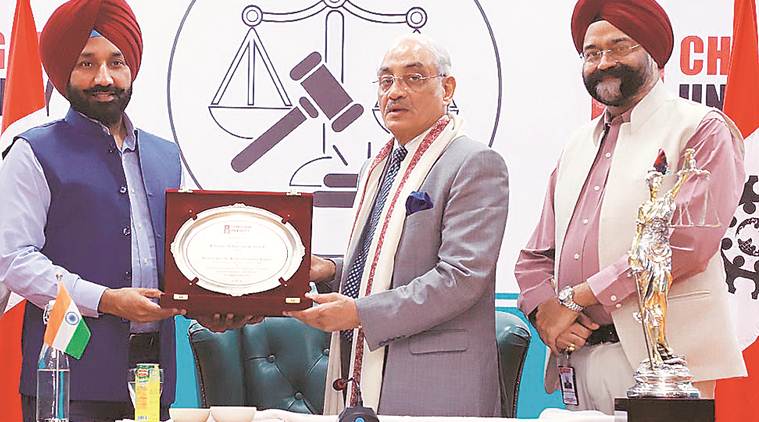
“Youth who are the greatest assets of a nation have to be the custodians of nature. They have to come forward for its protection and create awareness among masses,” said Justice Swatanter Kumar, former Judge Supreme Court of India and former Chairperson of the National Green Tribunal. He was interacting with the students of University Institute of Legal Studies (UILS) at Chandigarh University. The university conferred Justice Swatanter Kumar with the Lifetime Achievement Award for his contribution to the Indian judiciary and the protection of the environment and society.
While interacting with the students, Justice Kumar said, “Indian heritage and religious traditions are known to be intertwined with the environment. In our ancient civilisation, we used to worship nature, which shows that our ancestors were knowledge rich and were acclimatised to protect the environment.” He advocated, allocating budget for precautionary healthcare, rather than spending money in constructing five-star hospitals to treat sick people. He said, every season there is a new viral infection and we have to take strong antibiotic drugs, which is turn make our body weaker day-by-day.
Highlighting the importance of the issue of climate change, Justice Kumar said, “Developed nations like France, Germany faced the furry of climate change recently when these countries experienced hot and humid climate of more than 40 degree Celsius. These countries started taking steps top protect the environment, while India, which is more likely to get affected due to climate change as it is an agriculture-based economy, the people are not sensitised enough.” He added, “Our mother nature is forgiving, as the mankind is destroying the environment, but recently we saw the monstrous behavior of nature in Uttarakhand and Kerala, where floods have become a common feature, occuring every year.”
Raising concerns over the growing global environment disaster, Justice Kumar said, “Chandigarh is producing 450 metric tons of waste every day, which is not even segregated properly. The city does not have a single garbage processing plant where it can treat its waste. The world is getting worse every day as we are dumping 80 billion pounds of plastic into the sea and one day we will have a sea of plastic and not even a single drop of water to drink.”
Justice Kumar also warned against the hazardous activities around the world and said, “Activities of waste dumping into the sea and the melting of glaciers are interconnected and have resulted in the rise in water-level in sea and oceans, which is expected to create a havoc by 2030. It is said that half of the countries on-the-shore will be submerged under the sea-water by then.”
Citing the example of India, Justice Kumar said, “In India, Rohtang Pass was one of the most beautiful passes we had, there used to be 12-feet of snowfall but as 7,000 vehicles frequent the pass every day, the glaciers around the pass have started melting at an alarming rate of 1 meter per year and the ice has started turning black due to the pollution emitted by vehicles.” Justice Kumar advised the government that “Sustainable development and environment protection can go hand-in-hand and the Shimla railway line constructed by britishers is the best example for it.”